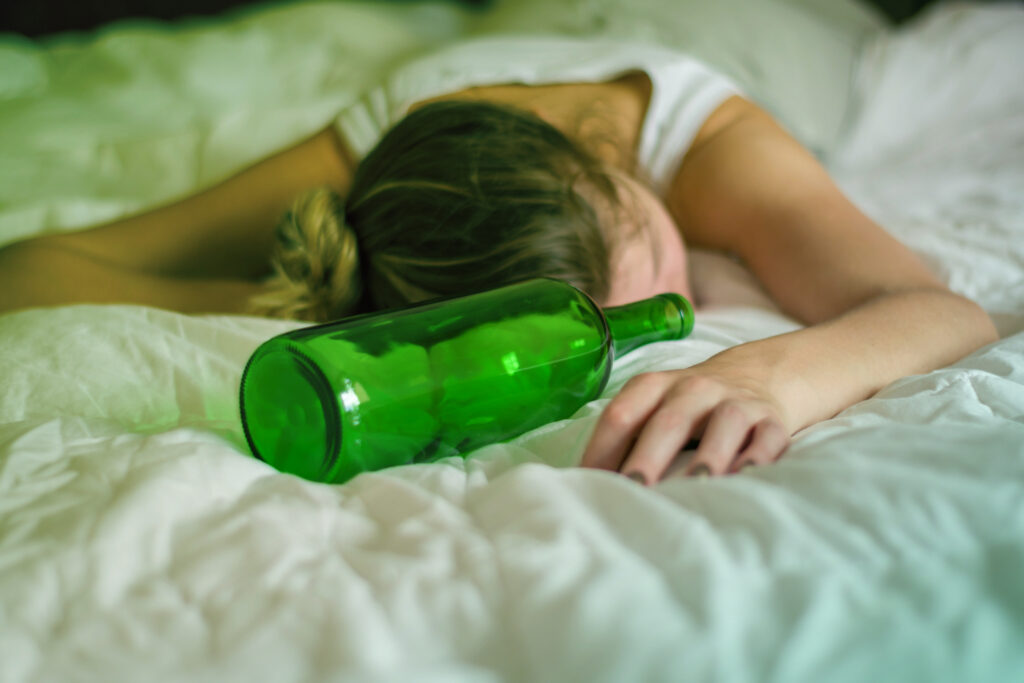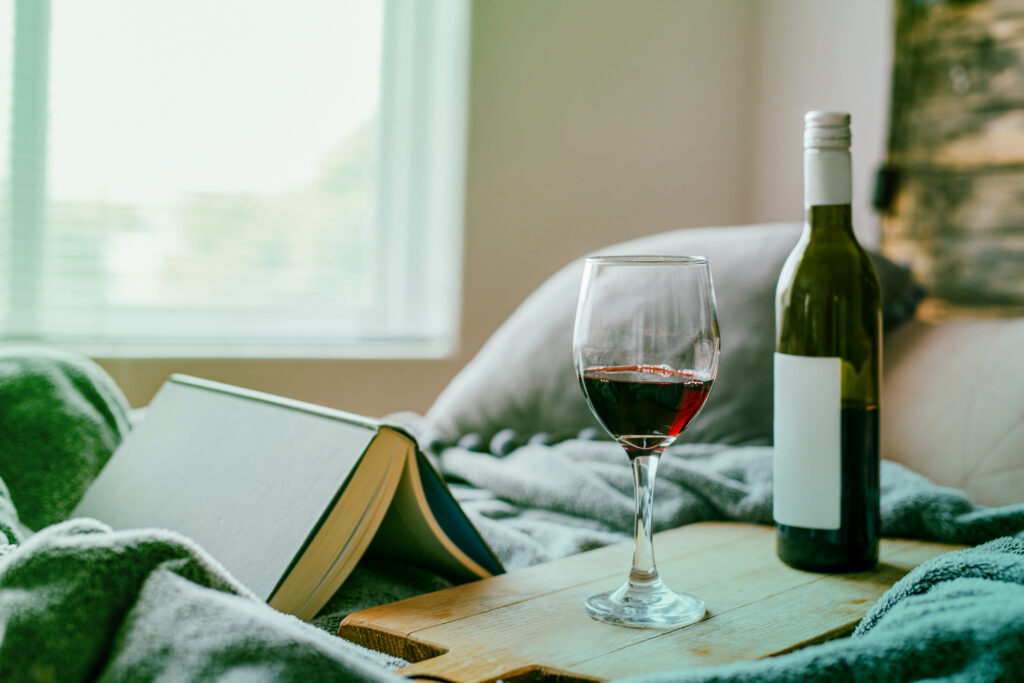The relationship between booze and bedtime routines is a complicated one – and something that researchers are still trying to understand.
On one hand, alcohol is a central nervous system depressant. Like melatonin, the substance responsible for regulating your sleep cycle naturally, alcohol slows down brain activity, and helps you to relax.
Having a drink before bed can be a lot like taking a sedative.
Your glass of red will induce feelings of sleepiness and relaxation – but what does it mean to the overall quality of your sleep?
Ultimately, even if booze helps you to drift off initially, it might be one of the major problems contributing to your issues with insomnia and sleep deprivation.
Studies show that alcohol use exacerbates sleep apnea, and even drinking in moderation can make it harder to achieve periods of deep, restful sleep.

What is a nightcap? How alcohol affects sleep
The tradition of having a nightcap before bed is one of the things that prompts people to believe that drinking before sleep is good for you. After all, for decades, people had a quick glass of whisky or brandy before bed to help them drift off.
Unfortunately, nightcaps aren’t as helpful as we once thought.
When you have a late-night drink, you absorb the alcohol into your bloodstream. Eventually, the enzymes in your liver will metabolize that booze, but it’s a slow process.
That means that alcohol circulates throughout your body for a decent amount of time.
How much you respond to alcohol will depend largely on you. However, studies frequently show that people who drink large amounts of alcohol before bed are more prone to issues with delayed sleep onset.
This means that these individuals need more time to fall asleep.
As liver enzymes begin to metabolize the alcohol through the night, you’ll also be more likely to experience disruptions in sleep quality.
Alcohol and sleep cycles
To fully understand the relationship between alcohol and sleep, you need to understand the different stages of the sleep cycle.
Normal sleep cycles consist of four stages:
- NREM (Stage 1): The first stage of NREM (non-rapid eye movement) sleep is the transition period between wakefulness and sleep. During this time, the body begins to shut down, breathing and eye movements slow, and muscles relax. Brain activity may also decrease.
- NREM (Stage 2): During the second stage of NREM, heart rate and breathing rates continue to slow as the person progresses towards deeper sleep. Stage 2 is generally the longest of the four sleep cycle stages.
- NREM (Stage 3): The third stage of non-rapid eye movement sleep is when breathing rates, heartbeat, and brain activity all reach their lowest levels. Eye movements stop and the muscles relax. This is the stage known as slow-wave sleep.
- REM: In rapid eye movement sleep, eye movements generally restart about 90 minutes after the person falls asleep. Your breathing rate and heart rate begin to speed up again, and you may have dreams. Dreams help with memory consolidation, so you can organize your thoughts ready for the next day.
The four sleeping stages occur in a cyclical way throughout the night, each lasting between 90 and 120 minutes. Most people get around four or five cycles of sleep each night.
As you progress through your sleep cycles, your REM sessions will gradually become longer.
So, what happens when you add alcohol to the mix?
Alcohol and sleep don’t work well together. In the initial stages of sleep, alcohol suppresses REM, so you often sleep deeply rather quickly, without dreams. However, this usually leads to an imbalance in your slow-wave and REM sleep in the long-term.
Ultimately, the result is a poor sleep quality.
Melatonin and alcohol: Does alcohol cause insomnia?
If you suffer from sleep deprivation, poor sleeping habits, or insomnia, your doctor will often recommend changing your sleep hygiene routine. This will often involve following a schedule every night, avoiding alcohol, and taking natural supplements.
Melatonin is a common supplement for sleep disorders. However, because melatonin and alcohol have similar sedating effects, they’re not safe to take together.
Before you begin taking any pills for sleep disorders, your doctor will ask you to cut out habits that could be harming your sleep – which includes drinking alcohol.
Because alcohol reduces REM sleep and causes more sleep disruptions, it often leads to insomnia symptoms and excessive sleepiness the next day.
In some cases, alcohol and sleep begin to exist in a vicious cycle.
People begin self-medicating with alcohol to get to sleep, then use caffeine and other stimulants to stay awake during the day. Researchers note a link between long-term alcohol use and chronic issues with sleep.
Many individuals also develop a tolerance for alcohol very quickly. This means that you may end up drinking more and more before going to bed so you can initiate sleep.
Other ways alcohol causes sleep problems
As you can see, just because the answer to “does alcohol make you sleepy?” is usually “yes”, doesn’t mean that a night cap is a great way to finish your day. Alcohol and sleep often make a bad pair, leading to long-term problems with sleep disturbances and insomnia.
Alcohol can also worsen or increase the symptoms of sleep apnea, a disordered characterized by abnormal breathing or less of breath during sleep. Lapses in breathing can cause disruptions and damage your sleep quality.
There are different kinds of breathing issue in the world of apnea. Obstructive sleep apnea is what happens when physical blockages occur towards the rear of the throat.
Alternatively, central sleep apnea happens when the brain can’t properly signal muscles in the throat to control breathing.
Alcohol often has an impact on obstructive sleep apnea issues because it causes the muscles in the throat to relax. This creates more resistance during breathing.
This is also the reason why drinking alcohol often leads to snoring. Studies say that consuming alcohol increases the risk of issues with obstructive sleep apnea by up to 25%.
A single drink before sleep can be enough to cause OSA, heavy snoring, and other breathing issues – even for people who aren’t diagnosed with sleep apnea.

Is a small amount of alcohol safe before sleep?
Generally, a small amount of alcohol before sleep should be safe enough that you won’t cause any long-term problems. However, the effects of alcohol differ from one person to the next.
In some cases, even a low amount of booze could cause significant problems with your sleep quality.
Additionally, if you continue drinking small amounts of alcohol on a regular basis, you’ll gradually build a tolerance to its effects. This means that you’ll need to drink more and more to get the same relaxing feelings.
A study in 2018 compared people consuming different amounts of alcohol before bed and found:
- Low levels of alcohol before sleep, often less than two servings for day for men, or one serving for women, reduced sleep quality by 9.3%.
- Moderate levels of alcohol before bed reduced the quality of sleep for men and women by up to 24%.
- High levels of alcohol before bed (more than two servings for men and 2 servings for women) reduced sleep quality by up to 39.2%.
As you can see, the best way to ensure you’re going to have a good night’s sleep is to avoid alcohol altogether. Ideally, you’d stop drinking around four hours before you’re due to go to bed to get the alcohol out of your system completely.
However, drinking alcohol up to six hours before sleep can lead to disruptions for some people.
Say no to the nightcap and get a good night’s sleep
If you find yourself regularly combining alcohol and sleep, then you might have an underlying issue that you need to address. Alcohol isn’t the best tool for people who have trouble falling asleep.
Although it might help to relax you initially, it will damage your sleep quality in the long-term.
If you decide to try more natural ways of overcoming your sleep problems, remember that melatonin and alcohol don’t work well together. Many natural supplements and solutions for boosting sleep quality rely on you staying away from other sedatives (like booze).
If you know that you will be drinking before bed, but you want to get up feeling bright-eyed and bushy-tailed in the morning, know your limits. Don’t drink too much within the four hours before you go to bed, and hydrate with plenty of water in between drinks.
You’ll also find it helpful to practice some basic sleep hygiene strategies, like taking a hot bath before you’re ready for sleep, or updating your bedroom to ensure it’s as dark, cool, and comfortable as possible.
Sweet dreams!
ReWired: ReThink Your Life.




